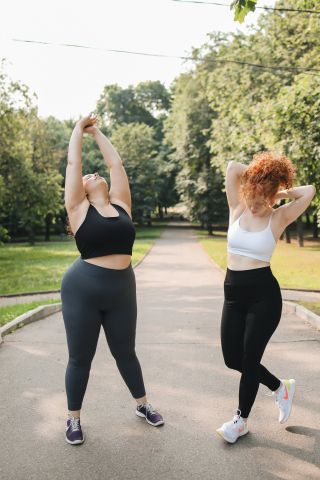Body Image
Why You Shouldn't Worry How You Look When You Work Out
Just avoid gym mirrors—or get out of the gym altogether.
Posted December 6, 2023 Reviewed by Lybi Ma
Key points
- Thinking about how a body looks often makes mood and body image worse.
- Many elements of fitness environments encourage people to focus on how they look.
- Thinking about how you look while you exercise can undermine the benefits.

You don’t have to look far to find evidence that exercise is generally good for you. It can reduce your risk of cardiovascular disease, improve your memory, improve your body image, and even help you manage anxiety and depression. On top of that, workouts can be an opportunity to try a fun new activity or connect with others. However, two new studies of women who exercise regularly suggest that thinking about how you look while you exercise can undermine some of these benefits.
Overall, research evidence suggests that people who exercise feel better about their bodies. Even one workout can be enough for at least a temporary boost in body image. The evidence for the positive impact of exercise on mood is similar. For example, a recent meta-analysis concluded that people who exercise regularly are less likely to experience depression, and even 30 minutes of aerobic exercise can result in a short-term increase in positive mood.
But there’s a growing body of evidence that exercise contexts aren’t all created equal when it comes to the psychological benefits of exercise. In particular, appearance-focused exercise may not provide those desired boosts in mood and body image.
At a basic level, the more you enjoy exercise and feel good while you’re doing it, the more likely you are to stick with it. But we know from numerous studies that for women, thinking about how their body looks often makes mood and body image worse. And many elements of fitness environments encourage exercisers to focus on how they look—from giant mirrors to instructors who focus on calories and weight loss, to all those spandex-clad worker-outers you can compare yourself to.
In two new studies published in The Journal of Social and Clinical Psychology, we demonstrated how thinking about how your body looks can undermine the positive benefits of exercise. In the first study, we surveyed over two hundred U.S. women who identified as regular exercisers about their workout habits and motivations. We found that women who monitor how their bodies look when they work out enjoy exercise less and exercise less frequently.
In the second study, we recruited 181 women between the ages of 18-30 to complete a 30-minute online fitness class that was taught via Zoom. The class was challenging, including high-intensity movements like burpees and jump squats. The women completed measures of body image and mood right before and right after the exercise class.
Consistent with previous research, working out tended to improve women’s mood and body satisfaction. However, women who reported thinking about how their bodies looked during the class showed less improvement in mood and body satisfaction.
At the end of the class, we asked the women to list three words that best described how they felt. Women who thought a lot about how their bodies looked during the class listed more negative words like “self-conscious” and “weak.” Women who spent less time during class thinking about how they looked listed more positive words like “proud” and “energized.”

The take-home message from these studies is clear. If you want to enjoy your workouts and maximize the benefits, focus less on how you look when you’re exercising and more on what your body is doing and how it feels. Try to wear clothing that’s comfortable to move in and doesn’t leave you self-conscious.
If you’re one of the lucky fitness enthusiasts who enjoy exercise, focus more on the fun and less on what you see in that mirrored gym wall. If you’re someone who finds exercise a chore, try to recalibrate your exercise motivations so they’re not focused on changing how you look, but on changing how you feel. As a bonus, when you can, head outside for your workouts. Natural vistas might give you an additional mood and body image boost and you can avoid seeing yourself in the mirror.
Facebook/LinkedIn image: Drazen Zigic/Shutterstock


